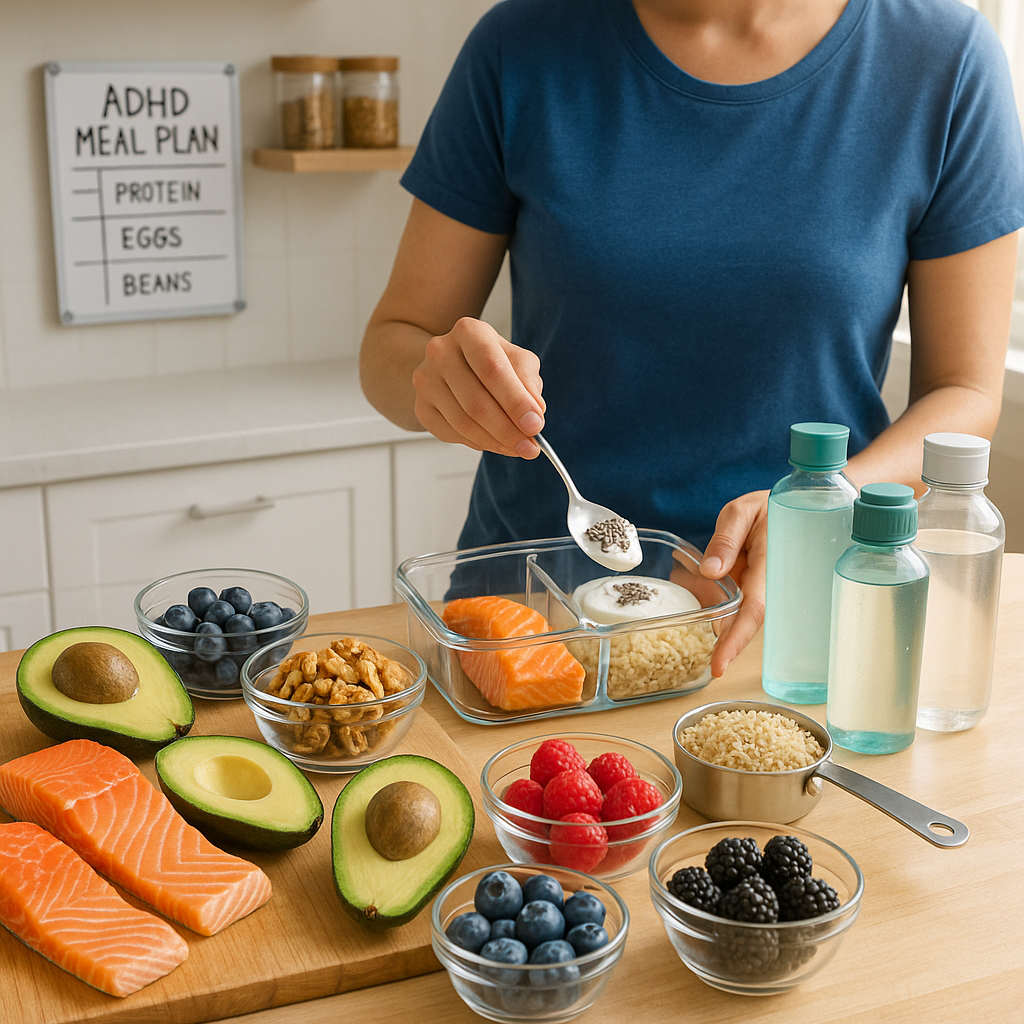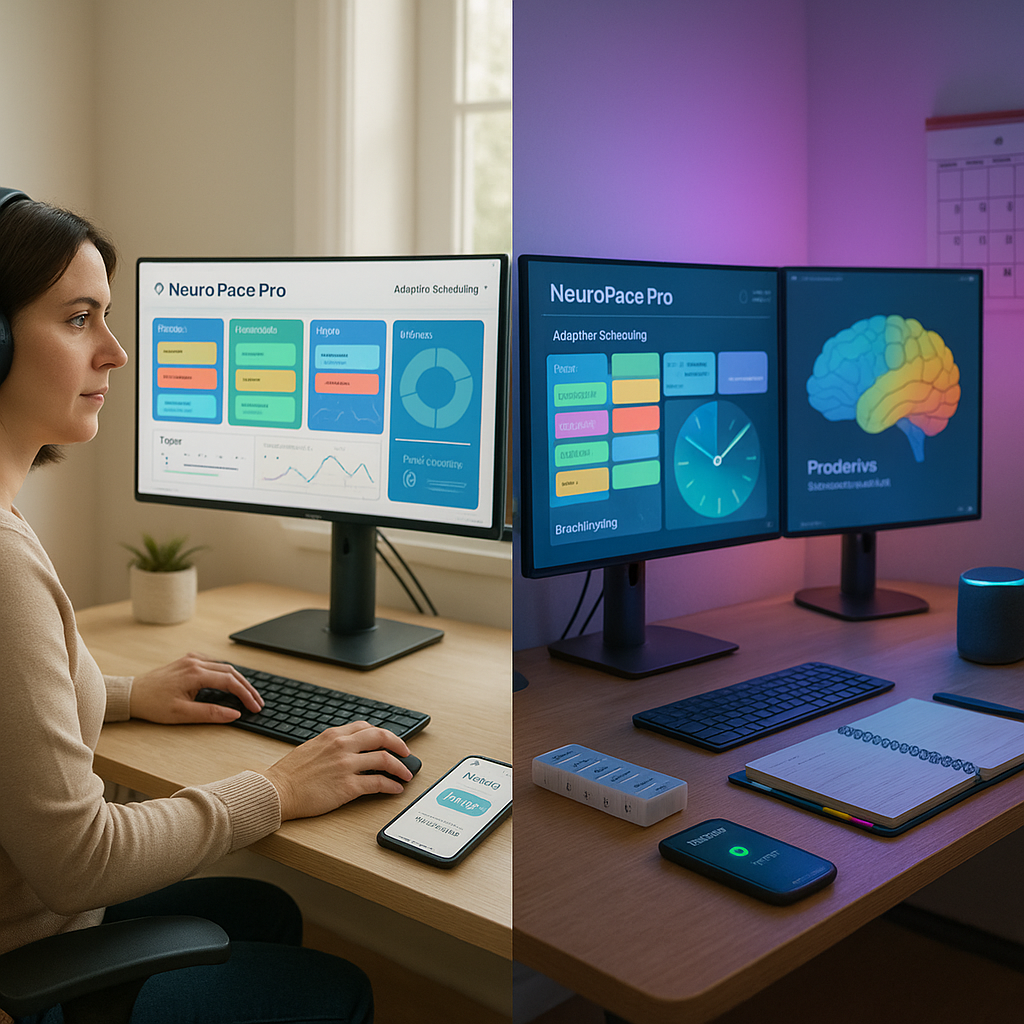Key Takeaways
- Feed your brain, fuel your focus. Balancing proteins, healthy fats, and complex carbohydrates helps smooth out ADHD energy spikes, supporting clarity and sustained attention throughout the day.
- Steady energy starts with blood sugar balance. Prioritizing slow-digesting foods and regular meals prevents crashes and mood swings, giving you greater control over your energy and emotions.
- Master micronutrients for mood and cognition. Targeted nutrients like omega-3s, magnesium, zinc, and iron can significantly impact emotional stability, cognitive function, and attention. Smart supplementation or mindful food choices can be game changers for many.
- Hydration is your hidden superpower. Even mild dehydration can amplify distraction, fatigue, and brain fog. Staying hydrated is a simple, often overlooked strategy for maintaining clearer thinking and emotional balance.
- Routine beats restriction every time. Consistent eating patterns and flexible structure work better for ADHD than strict diets. Building steady habits reduces overwhelm while leaving space for both nutrition and spontaneity.
- Small tweaks drive big change. ADHD-friendly nutrition isn’t about perfection. Small, practical upgrades (like prepping quick snacks or tossing greens into a meal) stack up over time to major improvements in focus and well-being.
By shifting your mindset from chasing dietary perfection to embracing sustainable, personalized choices, you can eat in a way that truly supports your unique neurodivergent brain. In the next section, we’ll dive into practical tools and ADHDink-approved meal ideas to turn these insights into daily wins.
Introduction
On chaotic days, skipping meals or grabbing the nearest snack may feel like the only option. However, for ADHD brains, every bite can be a lever for focus, clarity, and resilience. ADHD nutrition isn’t about rigid rules or dieting fads. It’s about making intentional, simple choices that stabilize energy and mood from the inside out.
Understanding how balanced meals, key nutrients, and consistent tweaks in your eating habits can directly influence brain function and emotional regulation unlocks practical strategies for managing overwhelm and avoiding burnout. Adjusting your nutrition is a direct way to gain more control over your attention, smooth out mood swings, and build the energy reserves necessary for whatever your day may bring.
The Brain-Food Connection: Understanding ADHD Nutrition
The link between nutrition and ADHD goes well beyond basic sustenance. Our brains account for about 20% of daily energy consumption, making what you eat a critical factor in managing symptoms and sustaining energy. For neurodivergent minds, this connection can be even more direct. Fueling your brain with quality nutrients transforms meals into a daily opportunity for peak performance.
Think of your brain as a high-performance engine. Just as a luxury car needs premium fuel for optimal output, your neurodivergent mind thrives on intentional, high-quality nutrition. When you embrace this mindset, every meal becomes a chance to support better focus, emotional stability, and resilience.
Essential Nutrients for the ADHD Brain
Optimizing your daily nutrition means focusing on key building blocks that directly support brain health and executive function.
Protein: Your Brain’s Building Blocks
Protein is vital for neurotransmitter production, especially dopamine and norepinephrine, which play major roles in regulating attention and motivation. Consistent protein intake helps maintain steady energy and enhances focus throughout the day.
ADHD-friendly protein solutions include:
- Greek yogurt paired with berries for a fast, satisfying snack
- Batch-cooked hard-boiled eggs, ready in the fridge for grab-and-go moments
- Pre-portioned nuts and seeds for easy snacking
- Ready-to-drink protein shakes to fuel you when time is tight
Omega-3 Fatty Acids: Brain Power Boosters
Omega-3s are essential for brain cell health and play a significant role in supporting attention and reducing inflammation. Studies show that individuals with ADHD often benefit from increasing omega-3 intake.
Smart sources include:
- Fatty fish such as salmon or mackerel (perfect for meal prepping)
- Walnuts and chia seeds (toss into oatmeal or yogurt)
- Omega-3 enriched eggs for versatile meal options
- Quality supplements if consistent intake is a challenge, particularly during high-stress periods
Complex Carbohydrates: Steady Energy Supply
Complex carbohydrates are the slow-burning fuel your brain needs to avoid the notorious crash-and-burn cycle. Unlike simple sugars, they provide gradual energy release and help regulate blood sugar.
Helpful examples include:
- Whole grain toast with avocado for an energizing breakfast or snack
- Overnight oats prepped for multiple days (easy to customize)
- Sweet potatoes, which cook quickly and store well as leftovers
- Quinoa, a fiber-rich option that pairs well with proteins and veggies
Micronutrients: Small Compounds, Big Impact
Micronutrients like magnesium, zinc, iron, and B-vitamins are often under-consumed but play vital roles in cognitive health, emotional regulation, and energy production. For professionals or students dealing with busy schedules, targeted supplementation (after consulting a healthcare provider) may address shortfalls and boost cognitive function.
Strategic Eating for Symptom Management
Understanding the timing and composition of meals can dramatically influence focus and emotional stability throughout the day.
Blood Sugar Regulation: Your Natural Mood Stabilizer
Rapid blood sugar swings can amplify ADHD symptoms, making it harder to concentrate or regulate emotions. Managing blood sugar is as much about routine as it is about food choices.
Strategies for stable blood sugar:
- Avoid skipping meals (set phone alarms as reminders, if needed)
- Pair protein with complex carbs at each meal for sustained energy
- Stash emergency snacks (such as nuts or bars) in your workspace, bag, or car
- Plan meals around your peak energy times. For many, this means a protein-focused breakfast and balanced midday meal
Timing Your Nutrition
Working with your body’s natural rhythms streamlines nutrition and helps reduce decision fatigue. ADHD-friendly strategies include:
- Front-loading protein at breakfast for optimum morning focus
- Spacing meals every 3–4 hours for consistent energy
- Placing healthy snacks in visible, accessible spots (clear containers on the counter or desk)
- Scheduling meal prep when your executive function is strongest (perhaps after a workout or during a burst of motivation)
Practical Implementation Strategies
Nutrition becomes more sustainable when integrated into your daily environment and routines. Let’s explore methods that make healthy eating frictionless, even on your busiest days.
Making Nutrition ADHD-Friendly
Simplifying your food choices reduces overwhelm and decision fatigue.
- Create a “capsule menu” of 5–7 favorite, easy-to-prepare meals
- Stock your pantry and fridge with the same core ingredients each week
- Use visual cues like photos or sticky notes to prompt meal ideas
- Prep food components (like roasted veggies, pre-chopped fruit, or cooked grains) rather than assembling entire meals in advance
Automation can also reduce stress and increase consistency.
- Opt for grocery delivery or subscription services to ensure a stocked kitchen
- Keep a printed, reusable shopping list handy to stay organized
- Set up app reminders for mealtimes and grocery restocks
- Use high-energy times to batch-cook items for the week
Environment Design for Success
Your physical space can either support or challenge your nutrition goals. Thoughtful environment design includes:
- Placing healthy snacks and convenient meal fixes at eye level
- Distributing shelf-stable protein options (like bars or nut packs) in multiple locations (your car, work bag, desk, or nightstand)
- Using clear or labeled containers to make healthy choices obvious
- Setting up a dedicated snack station for effortless grab-and-go fueling
Advanced Optimization Techniques
Personalizing nutrition ensures that your efforts meet your unique needs and circumstances.
Identifying Personal Triggers and Enhancers
Food and environment interact uniquely with every brain. Experiment and track which variables make the most difference for you:
- Caffeine dose and timing. Some ADHD brains thrive, others crash
- Ideal meal spacing and portion sizes for your energy profile
- Food combinations that support focus versus those that lead to slump
- Environmental factors. Do you focus best when eating in calm surroundings or with gentle background stimulation?
Building Sustainable Habits
Building robust habits is about progress, not perfection.
- Start by upgrading just one meal or snack at a time
- Use visual reminders and cues to spark new routines
- Plan ahead for disruptions; have backup options for busy or low-energy days
- Celebrate small victories (such as prepping breakfast for the week or hitting water intake goals)
The foundation of lasting change is self-compassion and adaptability. Sustainable nutrition for ADHD brains grows from small, consistent changes that accommodate your lifestyle.
Conclusion
Supporting an ADHD brain through nutrition requires more than following generic health advice. It’s about tuning into your individual neurochemistry and building systems that remove friction from positive choices. Consistently prioritizing protein, omega-3s, complex carbohydrates, and vital micronutrients crafts a robust foundation for focus, energy, and resilience. Meanwhile, routines like meal prepping, automated reminders, and visible snack stations transform intentions into reliable habits.
Customizing your environment and strategies allows you to turn nutrition from a daily hurdle into a performance asset. Remember, steady improvement, not perfection, is the real goal. By giving your brain premium fuel and building ADHD-friendly systems, you tap into your neurodivergent strengths and create space to thrive personally and professionally.
Looking ahead, the next evolution in ADHD nutrition will come from harnessing smart technology, intuitive habit design, and personalized systems that respond to your ever-changing needs. As science and innovation in neurodivergence and nutrition advance, those who adapt boldly and creatively will lead the way toward sustainable well-being and productivity. On their own terms, of course. The future of ADHD-friendly living starts with the next meal you choose and the systems you build to support your unique brilliance.





Leave a Reply